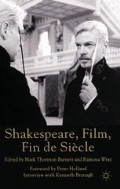Abstract
As the twentieth century concludes, the burdens of its history — and of what was made of its historical inheritances — have been more and more overtly thematized in several art-forms. One hallmark of postmodernism is a detached playfulness with history: wry quotations of the past appear as isolated architectural elements, as recontextualized figures in visual works, as characters haunted by lost (but tantalizingly ‘present’) connections with source-texts in narrative. The enormities of this century provide sufficient rationale for such detachment; if the earnestness of high art is no longer conceivable in the West after the Holocaust, then understated disengagement offers a welcome refuge. An alternative path, though, is a heady immersion into the unsettling stuff of history, a wilful involvement with the passions as well as the trappings of the past. Such a passionate approach may still entertain ideas of performativity as well as sincerity; Shakespeare’s historical tragedies regularly depend upon both. In his dispute with readings that ignore this volatile mixture, Jonathan Dollimore has argued that a Shakespearean playtext such as Antony and Cleopatra is predicated upon what he calls ‘the profound truth of camp, the “deep” truth of the superficial: if it’s worth doing, it’s worth overdoing’.1
Access this chapter
Tax calculation will be finalised at checkout
Purchases are for personal use only
Preview
Unable to display preview. Download preview PDF.
Notes
Jonathan Dollimore, ‘Shakespeare Understudies: the Sodomite, the Prostitute, the Transvestite, and Their Critics’, in Jonathan Dollimore and Alan Sinfield (eds), Political Shakespeare: New Essays in Cultural Materialism (Ithaca and London: Cornell University Press, 1994), p. 147.
All references from Shakespeare’s play are taken from Richard III, ed. Antony Hammond (London: Methuen, 1981). McKellen, in the published screenplay, mentions only ‘standard editions’ as his textual sources: see Ian McKellen, William Shakespeare’s ‘Richard III’: A Screenplay (New York: Doubleday, 1996), p. 39.
Jack Babuscio, ‘Camp and the Gay Sensibility’, in Richard Dyer (ed.), Gays and Film (New York: Zoetrope, 1984), p. 41.
Lois Potter, ‘A Country of the Mind’, Times Literary Supplement, 4557, 3–9 August (1990), p. 825.
Samuel Crowl, ‘Richard III’, Shakespeare Bulletin, 14:2 (1996), p. 38; Robert F. Willson, Jr, ‘Hunchbacked Führer: Loncraine’s Richard III as Postmodern Pastiche’, unpublished paper presented at the 1997 meeting of the Shakespeare Association of America, p. 4.
Ian Frederick Moulton, ‘“A Monster Great Deformed”: The Unruly Masculinity of Richard III’, Shakespeare Quarterly, 47 (1996), p. 265.
Peter Holland, ‘Shakespeare Performances in England, 1989–90’, Shakespeare Survey, 44 (1991), pp. 189–90.
Andrew Hewitt, Political Inversions: Homosexuality, Fascism, and the Modernist Imaginary (Stanford: Stanford University Press, 1996), pp. 66–7.
James N. Loehlin, ‘“Top of the World, Ma”: Richard III and Cinematic Convention’, in Lynda E. Boose and Richard Burt (eds), Shakespeare, the Movie: Popularizing the Plays on Film, TV, and Video (London and New York: Routledge, 1997), p. 75.
Hugh M. Richmond, Shakespeare in Performance: ‘King Richard III’ (Manchester: Manchester University Press, 1989), p. 58.
Derek Jarman, Queer Edward II (London: BFI Publishing, 1991), p. 20.
Editor information
Editors and Affiliations
Copyright information
© 2000 Palgrave Macmillan, a division of Macmillan Publishers Limited
About this chapter
Cite this chapter
Buhler, S.M. (2000). Camp Richard III and the Burdens of (Stage/Film) History. In: Burnett, M.T., Wray, R. (eds) Shakespeare, Film, Fin de Siècle. Palgrave Macmillan, London. https://doi.org/10.1057/9780230286795_4
Download citation
DOI: https://doi.org/10.1057/9780230286795_4
Publisher Name: Palgrave Macmillan, London
Print ISBN: 978-0-333-77664-3
Online ISBN: 978-0-230-28679-5
eBook Packages: Palgrave Literature & Performing Arts CollectionLiterature, Cultural and Media Studies (R0)

